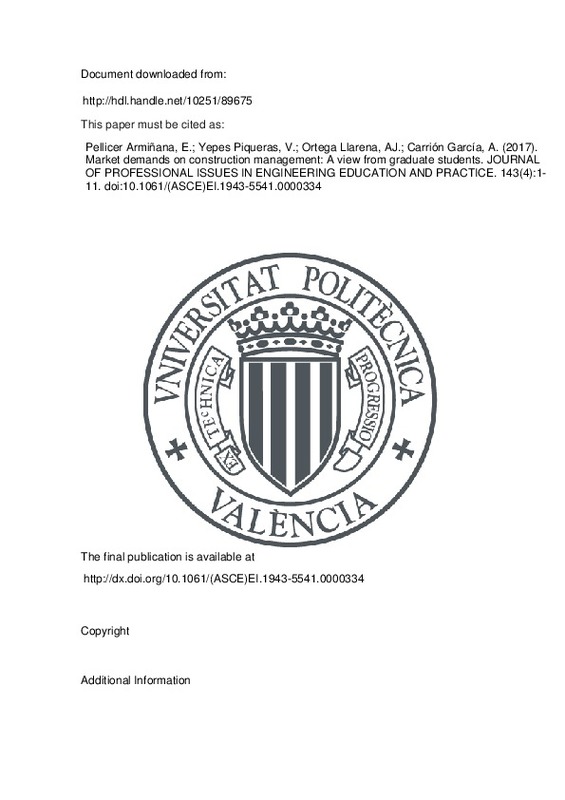JavaScript is disabled for your browser. Some features of this site may not work without it.
Buscar en RiuNet
Listar
Mi cuenta
Estadísticas
Ayuda RiuNet
Admin. UPV
Market demands on construction management: A view from graduate students
Mostrar el registro completo del ítem
Pellicer Armiñana, E.; Yepes Piqueras, V.; Ortega Llarena, AJ.; Carrión García, A. (2017). Market demands on construction management: A view from graduate students. JOURNAL OF PROFESSIONAL ISSUES IN ENGINEERING EDUCATION AND PRACTICE. 143(4):1-11. https://doi.org/10.1061/(ASCE)EI.1943-5541.0000334
Por favor, use este identificador para citar o enlazar este ítem: http://hdl.handle.net/10251/89675
Ficheros en el ítem
Metadatos del ítem
| Título: | Market demands on construction management: A view from graduate students | |
| Autor: | Ortega Llarena, Alejandro Javier | |
| Entidad UPV: |
|
|
| Fecha difusión: |
|
|
| Resumen: |
[EN] The construction industry demands managerial skills for professionals working within it, especially from those having an undergraduate civil engineering degree, which is generally pursued through graduate programs ...[+]
|
|
| Palabras clave: |
|
|
| Derechos de uso: | Reserva de todos los derechos | |
| Fuente: |
|
|
| DOI: |
|
|
| Versión del editor: | http://dx.doi.org/10.1061/(ASCE)EI.1943-5541.0000334 | |
| Código del Proyecto: |
|
|
| Agradecimientos: |
The authors are indebted to Professors Luis F. Alarcón, Salvador
García, David Eaton, Pawel Nowak, Gloria I. Carvajal, Sheyla
M. B. Serra, Carlos T. Formoso, M. Dolores Martinez-Aires, and
José C. Teixeira for their ...[+]
|
|
| Tipo: |
|







![[Cerrado]](/themes/UPV/images/candado.png)


